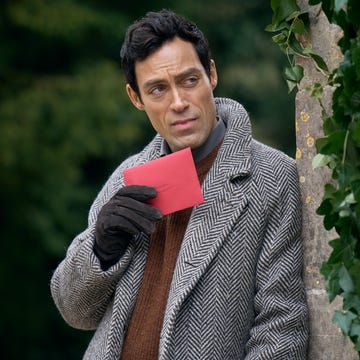There are some women who quite literally astound you and one of those women is Ann Ming, the subject of ITV’s heartbreaking new drama, I Fought the Law. When her daughter, Julie, was murdered in 1989, the mother-of-three from Billingham, County Durham, battled for 15 years to overturn the double jeopardy law, so that Julie’s murderer, William Dunlop, could finally face justice. The drama, starring Sheridan Smith, tells the story of her fight - and in an exclusive interview with Good Housekeeping, Ann opened up about the painful details behind her legal battle, including the fact that she was dealing with chronic PTSD at the time.
Ann told GH how, much to most people’s surprise, she didn’t have a big team behind her working to change the law. “When people find out I spent decades overturning the double jeopardy law, they assume I had a team of lawyers backing me up,” she explained. “Not at all! I kept pushing to change the law, despite having chronic PTSD, simply because I wanted justice for Julie. I couldn’t believe that my daughter’s killer [William Dunlop] had the arrogance to boast about getting away with the perfect murder when he appeared in court for assaulting a man and woman on separate occasions.”
What to read next
Ann revealed how, when Dunlop was in prison for GBH, he confessed to a female prison officer that he had killed Julie. “He was convinced he’d get away with it because jurors had twice failed to reach a verdict," says Ann. "The double jeopardy law, which dated back to Magna Carta, meant he couldn’t be tried for the same offence – for Julie’s murder – a third time.
“I was told that Dunlop could be charged with perjury for pleading not guilty to Julie’s murder, which was better than nothing. I went to every trial and every hearing over the years. When he was given six years for two counts of perjury in 2001 instead of the maximum tariff of 14 years I lost it. I was at the back of the court. I got up and shouted, ‘Six years? You knew where her body was and you didn’t tell anyone. You’re an evil psychopath. I’ll see you rot in hell.’ He was handcuffed to a prison officer, but I got really close. The judge’s mouth dropped open. I could have been charged with contempt of court, but I wasn’t.”
Ann went to see her MP the next day, who suggested she write to the then Home Secretary, David Blunkett. She got a letter done in Braille and he thanked her for the letter, arranging for her to go to the Home Office the day the white paper on double jeopardy was published.
“I couldn’t believe that it had got through the House of Commons and would be applied retrospectively, which meant Dunlop could be convicted,” says Ann. “But it still had to go through the House of Lords. I had a stroke of luck; I met Lord Falconer at a victims’ conference in Newcastle, and he agreed to let me appear in front of the Lords when they debated the double jeopardy law.
“I didn’t feel nervous; I knew I only had one chance. Not only did I want justice for Julie, but I’d met a lot of families who’d had acquittals, and you’re left in a state of limbo for the rest of your life. So I just told the Lords how I felt. I said, ‘My daughter had a right to life. That man took her life away. We’ve got a right to justice. The only way forward is to change the double jeopardy law and apply it retrospectively. Don’t be frightened.’
Ann shared how she got a phone call from her MP three weeks later, who said it had gone through the Lords successfully. "I couldn’t believe it – everyone had said I was wasting my time, but the law had finally been changed!” she remembers.
She can recall every moment of the day Dunlop was convicted at the Old Bailey in October 2006. “Charlie, Kevin and I sat in court number one, where Dr Crippen was tried,” she says. “Dunlop’s barrister said his client had been treated very unfairly – he’d never have confessed had he known the double jeopardy law would change. Dunlop wasn’t going to get away with Julie’s murder this time. His acquittal was finally quashed.
“I can’t tell you what it felt like to hear the word ‘guilty’ read out in court, even if it was 17 years after he’d killed my daughter,” Ann says of that pivotal moment. “After all those times in court when I was asked horrible questions – like whether I used my left or right hand to remove the bath panel that revealed my daughter’s dead body, giving me flashbacks to the day I found her – I’ll never forget the day Dunlop was sent down for murder – and our life sentence finally became his.”
All four episodes of I Fought the Law are available to watch on ITVX now,


![©ITV this image and the information contained herein is strictly embargoed until 00.01 tuesday 2 september 2025from hera picturesi fought the law sr1 ep4: on itv1 and itvxpictured: sheridan smith as ann mingthis photograph is (c) hera pictures and can only be reproduced for editorial purposes directly in connection with the programme or event mentioned above, or itv plc. this photograph must not be manipulated [excluding basic cropping] in a manner which alters the visual appearance of the person photographed deemed detrimental or inappropriate by itv plc picture desk. this photograph must not be syndicated to any other company, publication or website, or permanently archived, without the express written permission of itv picture desk. full terms and conditions are available on the website www.itv.com/presscentre/itvpictures/termsfor further information please contact:michael.taiwo1@itv.com](https://hips.hearstapps.com/hmg-prod/images/i-fought-the-law-sr1-ep4-18-68b841d216ebc.jpg?crop=0.668xw:1.00xh;0.259xw,0&resize=980:*)

![©ITV from hera picturesi fought the law: sr1: ep1 on itv1 and itvxpictured: sheridan smith as ann ming this photograph is (c) hera pictures and can only be reproduced for editorial purposes directly in connection with the programme or event mentioned above, or itv plc. this photograph must not be manipulated [excluding basic cropping] in a manner which alters the visual appearance of the person photographed deemed detrimental or inappropriate by itv plc picture desk. this photograph must not be syndicated to any other company, publication or website, or permanently archived, without the express written permission of itv picture desk. full terms and conditions are available on the website www.itv.com/presscentre/itvpictures/terms](https://hips.hearstapps.com/hmg-prod/images/i-fought-the-law-sr1-ep1-10-68b842013d3ee.jpg?crop=0.668xw:1.00xh;0.167xw,0&resize=980:*)











